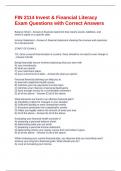-
1. Exam (elaborations) - Ae-financial literacy exam questions and answers
-
2. Exam (elaborations) - Alabama financial literacy test exam questions with complete answers
-
3. Exam (elaborations) - Chapter 19 financial literacy test exam questions with correct answers
-
4. Exam (elaborations) - Deca personal financial literacy exam questions with latest update
-
5. Exam (elaborations) - Deca personal financial literacy exam questions with latest update
-
6. Exam (elaborations) - Economics - financial literacy exam questions with latest update
-
7. Exam (elaborations) - Everything on the financial literacy exam questions with correct answers latest updat...
-
8. Exam (elaborations) - Fin 2114 invest & financial literacy exam questions with correct answers
-
9. Exam (elaborations) - Final exam financial literacy test exam questions and answers
-
10. Exam (elaborations) - Financial literacy - final exam questions and answers
-
11. Exam (elaborations) - Financial literacy - final exam questions with correct answers
-
12. Exam (elaborations) - Financial literacy 11th grade exam questions and answers
-
13. Exam (elaborations) - Financial literacy certification test exam questions with latest update
-
14. Exam (elaborations) - Financial literacy cumulative exam questions and answers
-
15. Exam (elaborations) - Financial literacy exam #2 questions with latest update
-
16. Exam (elaborations) - Financial literacy exam 1 questions with complete solutions
-
17. Exam (elaborations) - Financial literacy exam 2 questions and answers
-
18. Exam (elaborations) - Financial literacy exam 3 questions and answers
-
19. Exam (elaborations) - Financial literacy exam 4 questions with correct answers
-
20. Exam (elaborations) - Financial literacy exam 2023-2025 questions and answers
-
21. Exam (elaborations) - Financial literacy exam questions and answers latest update
-
22. Exam (elaborations) - Financial literacy exam questions and answers
-
23. Exam (elaborations) - Financial literacy exam questions with complete solutions
-
24. Exam (elaborations) - Financial literacy exam questions with correct answers
-
25. Exam (elaborations) - Financial literacy exam questions with latest update
-
26. Exam (elaborations) - Financial literacy exam review 4 exam questions with complete solutions
-
27. Exam (elaborations) - Financial literacy exam review part 2 ch 6-10 questions with latest update
-
28. Exam (elaborations) - Financial literacy exam review questions with correct answers
-
29. Exam (elaborations) - Financial literacy exam study guide questions and answers
-
30. Exam (elaborations) - Financial literacy exam study guide questions and answers
-
31. Exam (elaborations) - Financial literacy exam study questions and answers latest update
-
32. Exam (elaborations) - Financial literacy final exam practice questions with correct answers
-
33. Exam (elaborations) - Financial literacy final exam review (part 2) questions and answers
-
34. Exam (elaborations) - Financial literacy final exam review questions with latest update
-
35. Exam (elaborations) - Financial literacy practice test exam questions with correct answers
-
36. Exam (elaborations) - Financial literacy pre-test exam questions with correct answers
-
37. Exam (elaborations) - Financial literacy quiz questions with correct answers
-
38. Exam (elaborations) - Financial literacy state test review questions with latest update
-
39. Exam (elaborations) - Financial literacy test 1 exam questions with correct answers
-
40. Exam (elaborations) - Financial literacy test 2 questions with correct answers
-
41. Exam (elaborations) - Financial literacy test decision making exam questions and answers
-
42. Exam (elaborations) - Financial literacy test exam questions and answers
-
43. Exam (elaborations) - Financial literacy test exam questions with correct answers
-
44. Exam (elaborations) - Financial literacy test exam questions with verified answers
-
45. Exam (elaborations) - Financial literacy test guide #1 questions and answers
-
46. Exam (elaborations) - Financial literacy test questions and answers
-
47. Exam (elaborations) - Financial literacy test review exam questions with complete solutions
-
48. Exam (elaborations) - Financial literacy true and false exam questions and answers
-
49. Exam (elaborations) - Financial literacy-budgeting exam questions and answers
-
50. Exam (elaborations) - Geb 3006 exam 3 financial literacy exam questions with correct answers
-
51. Exam (elaborations) - Geb 3006 exam 3 financial literacy questions with latest update
-
52. Exam (elaborations) - General financial literacy course - utah, financial literacy state test exam question...
-
53. Exam (elaborations) - General financial literacy study guide exam questions with correct answers
-
54. Exam (elaborations) - Invest and financial literacy final exam questions and answers
-
55. Exam (elaborations) - Personal financial literacy final exam questions and answers
-
56. Exam (elaborations) - Personal financial literacy test exam questions and answers
-
57. Exam (elaborations) - Uni financial literacy exam review questions and answers
-
Show more




